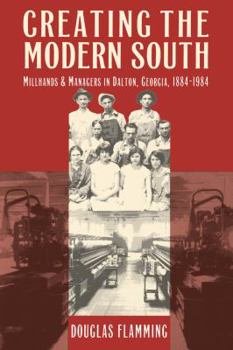Creating the Modern South: Millhands and Managers in Dalton, Georgia, 1884-1984 (Fred W Morrison Series in Southern Studies)
(Part of the Fred W. Morrison Series in Southern Studies Series)
Select Format
Select Condition 
Book Overview
Built by local entrepreneurs during Dixie's Cotton Mill in Dalton, Georgia, acted as a magnet for thousands of newly impoverished white farm families who moved to the factory and its company-owned village from the surrounding countryside. In Creating the Modern South, Douglas Flamming examines one hundred years in the life of the mill and the town, providing a uniquely perceptive view of Dixie's social and economic transformation.
With a sophisticated blend of statistical analysis, oral history interviews, and a variety of such traditional sources as company records, federal census schedules, and local newspapers, Flamming weaves an empirically convincing, richly embroidered description of life in a southern cotton-mill village. Whereas some historians have characterized southern textile workers as slaves in an "industrial plantation" system, and others have described the creation of an autonomous culture of opposition to management, Flamming focuses on the intimate, ever-changing, and potentially explosive relationship between millhands and managers, effectively demonstrating that both groups acted as architects of the emerging industrial order.
The Crown Mill story addresses important issues of social change faced by the modernizing South: the origins of small-town industry, worker migration from farm to factory, and the rise of an industrial elite; the adaptation of rural customs to an industrial environment and the development of a working-class culture; the advent of mill-village paternalism and the dilemmas of unionization; the impact of World War II on southern life; the collapse of paternalism and the antilabor backlash of the 1950s; and the decline of Dixie's cotton mills in the burgeoning Sunbelt economy. Ultimately, the history of the Crown Mill community both underscores the human dimensions of industrialization and places the New South in the broader context of an industrialized America.
With a sophisticated blend of statistical analysis, oral history interviews, and a variety of such traditional sources as company records, federal census schedules, and local newspapers, Flamming weaves an empirically convincing, richly embroidered description of life in a southern cotton-mill village. Whereas some historians have characterized southern textile workers as slaves in an "industrial plantation" system, and others have described the creation of an autonomous culture of opposition to management, Flamming focuses on the intimate, ever-changing, and potentially explosive relationship between millhands and managers, effectively demonstrating that both groups acted as architects of the emerging industrial order.
The Crown Mill story addresses important issues of social change faced by the modernizing South: the origins of small-town industry, worker migration from farm to factory, and the rise of an industrial elite; the adaptation of rural customs to an industrial environment and the development of a working-class culture; the advent of mill-village paternalism and the dilemmas of unionization; the impact of World War II on southern life; the collapse of paternalism and the antilabor backlash of the 1950s; and the decline of Dixie's cotton mills in the burgeoning Sunbelt economy. Ultimately, the history of the Crown Mill community both underscores the human dimensions of industrialization and places the New South in the broader context of an industrialized America.
Format:Paperback
Language:English
ISBN:0807845450
ISBN13:9780807845455
Release Date:November 1995
Publisher:University of North Carolina Press
Length:468 Pages
Weight:1.70 lbs.
Dimensions:1.0" x 6.1" x 9.3"
Customer Reviews
1 rating
rich and engaging book
Published by Thriftbooks.com User , 24 years ago
This book tells the story of Dalton, Georgia, and how the textile mill led to its development. It is a very detailed look at the townspeople and their struggles throughout a century. It provides a unique and perceptive view of the South's economic and social transformation beginning during the aftermath of the Civil War and continuing with the rise of technology into the Reagan years.





